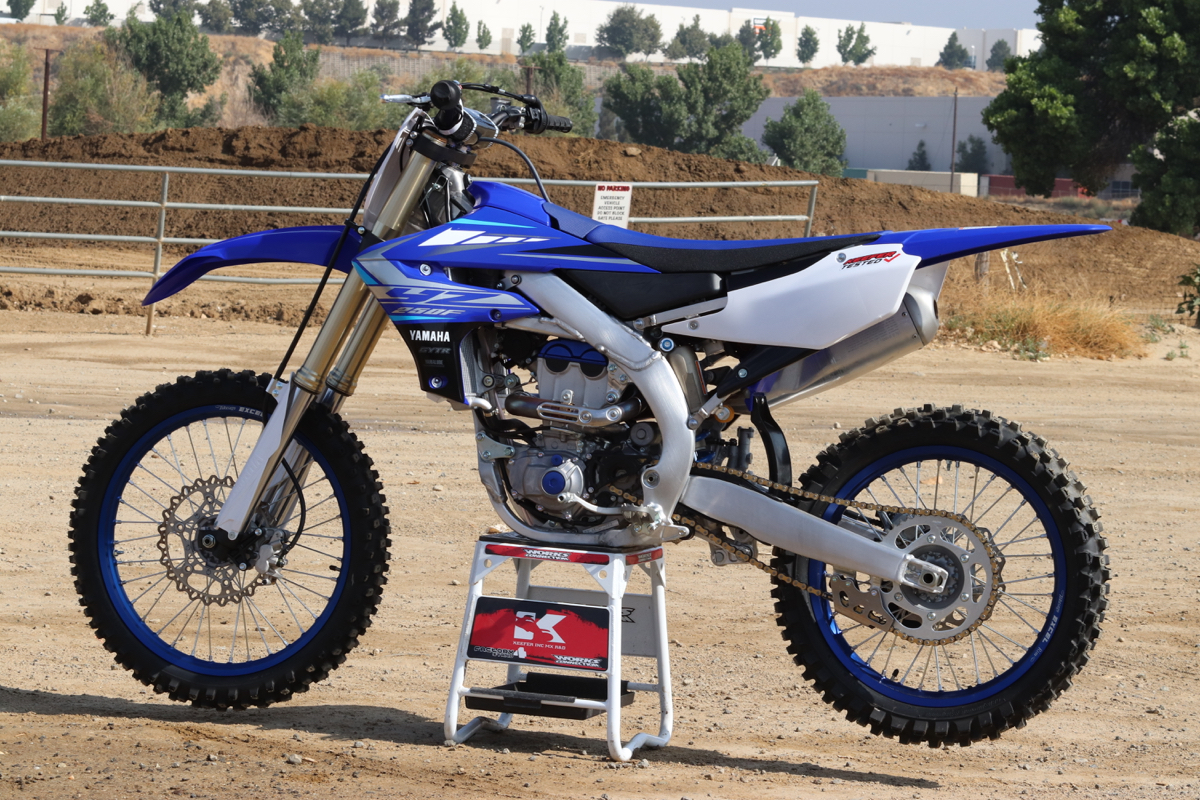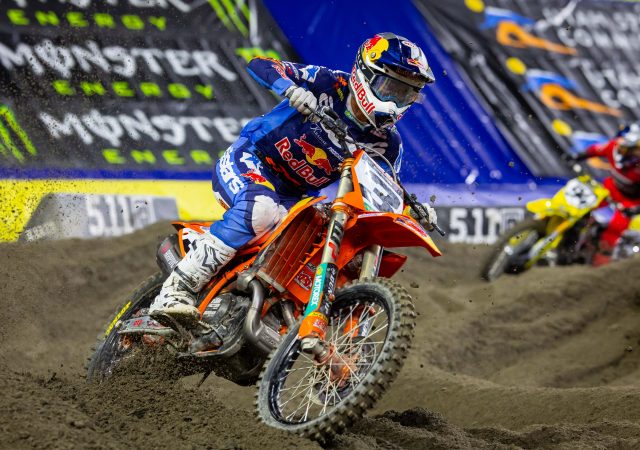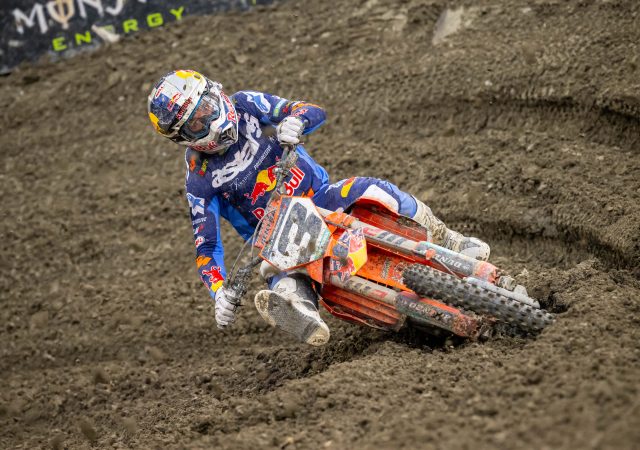The Yamaha YZ250F is un-changed for 2020 so this baseline set up article can be used for your 2019 YZ250F to get you going in the right direction as well. The Yamaha is the easiest small bore four stroke motocross machine to ride with its torquey low end, improved top end pulling power, and comfortable suspension/chassis that Yamaha came up with in 2019. For this test we focused on trying to keep the comfort that the Yamaha comes with, but also try to get the YZ250F to accept a rider that wants to push his limits on this bike. Below are some settings that we think may be able to help drop your lap times while keeping the Yamaha planted underneath you.
Suspension:
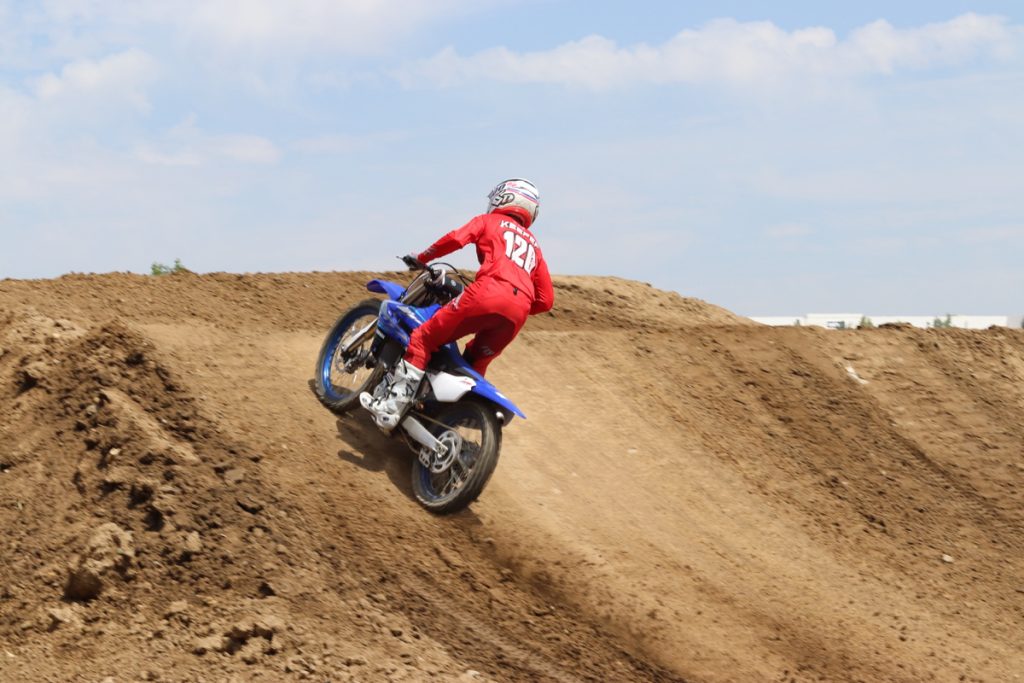
The KYB/SSS/Yamaha suspension has the most comfort out of any bike in stock form, but if you want to start pushing the bike’s limits it can get soft and spongy feeling. After our initial test we took the 2020 Yamaha YZ250F to three vastly different types of tracks and noticed as the bike broke in all riders wanted more hold up from the suspension. We tried going to a heavier 4.8N/m fork spring (4.7N/m is stock) with the stock valving and to all three testers (160, 170, 190 pounds) liked the hold up and calmness that the stiffer spring came with. The heavier front spring helped the Yamaha’s chassis under heavy braking and each rider was able to push into rough corners harder without as much pitching. Settling into ruts was also easier because of the calm front fork feel. The rear of the bike can accept heavier riders better than the front so going to a stiffer rear spring for us wasn’t warranted. What we really liked about this setting is that it didn’t upset chassis balance and only improved the bike’s overall feel out on the track. Only a small increase of firmness was felt on the top of the fork’s stroke, but all riders agreed that the trade off was worth it.
Fork:
Height: 4mm (Stock is 5mm)
Spring Rate: 4.8N/m (Stock is 4.7N/m)
Compression: 12 (Stock is 11 clicks out)
Rebound: 9-10 clicks out (Stock is 9 clicks out)
*Optional Stock Spring Fork Setting*
Height: 4mm
Spring Rate: 4.7N/m
Compression: 8 clicks out
Rebound: 7 clicks out
Shock:
Sag: 105mm
Spring Rate: 55N/m
High Speed Compression: 1.25 Turn Out (1 Turn Out Is Stock)
Low Speed Compression: 8-9 clicks out (10 clicks out is stock)
Rebound: 9 clicks out (11 clicks out is stock)
ECU/Yamaha Power Tuner:
I really felt that the 2020 Yamaha YZ250F could benefit from a free-er engine feel on de-cel so I worked on a map to try and achieve this. This “Keefer Free Feeling” map gives you less pitching on de-cel coming into the corners and also made the Yamaha feel lighter through mid-corner, which helped keeping the lean through corners as well as change of direction. I felt like I could give up a small amount of torque to achieve this and that is what you will find when going to this map. You will get slightly less torque, keep that great mid-range pull as well as a slight increase in top end. If you want to also sacrifice a little torque feeling and increase the second and third gear pulling power (with the same amount of engine braking the stock map gives) go to the “Hard Hitting Map” Yamaha has pre-programmed on your Yamaha Power Tuner App. I use the “Hard Hitting” for my base map and the Free Feeling” map for my secondary map. Please don’t forget to update your apps on your phone as Yamaha does update their Power Tuner with new maps from time to time.
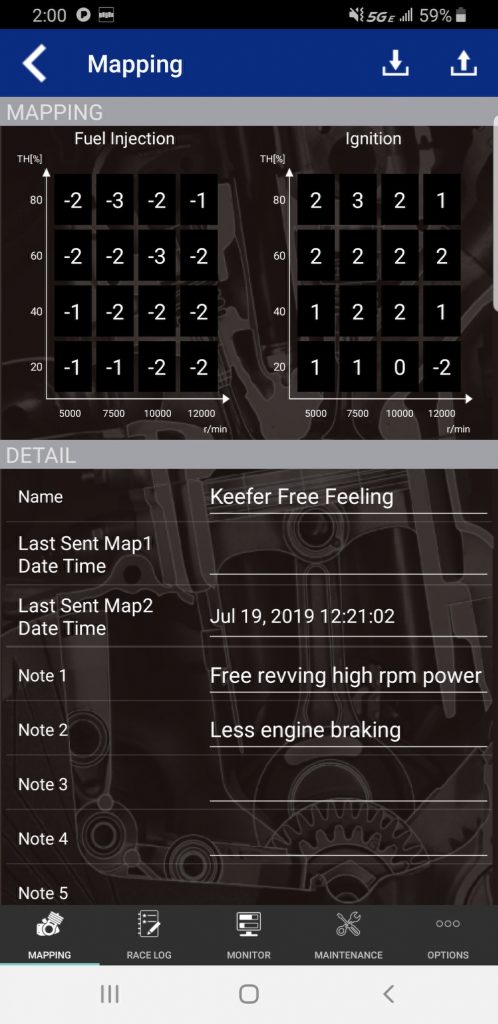
Chassis:
Please for the love of all things holy DO NOT screw/change the engine mounts on this machine. I will say that some aftermarket engine mounts will help some other OEM’s frame feel for the better, but in the case of the Yamaha YZ250F, it really doesn’t need aftermarket mounts. I have no problem pushing products that work, based on each individual machine, but that doesn’t mean that specific part works for every single machine. Some machines could benefit with a softer/stiffer mount combo, but to me Yamaha did a great job of blending comfort with cornering stiffness for 95% of us “normal” folk. When trying some aftermarket engine mounts on the 2019 YZ250F it made the bike have less predictability when the track got rough. When smooth I could see some benefit on initial lean through corners (lighter feel), but when the track got hammered the Yamaha was tougher to get into the corner because the damping character of the chassis was harsher on de-cel bumps. Could you make aftermarket engine mounts work on this bike? I am sure you could with the help of some suspension tuning, but the purpose of this article is to get you increased comfort/more performance with less hassle and money. If we were talking 2018 Honda or 2019-2020 Suzuki, I would be steering you into the aftermarket engine mount direction, but we are talking bLU cRU here people!
Gearing:
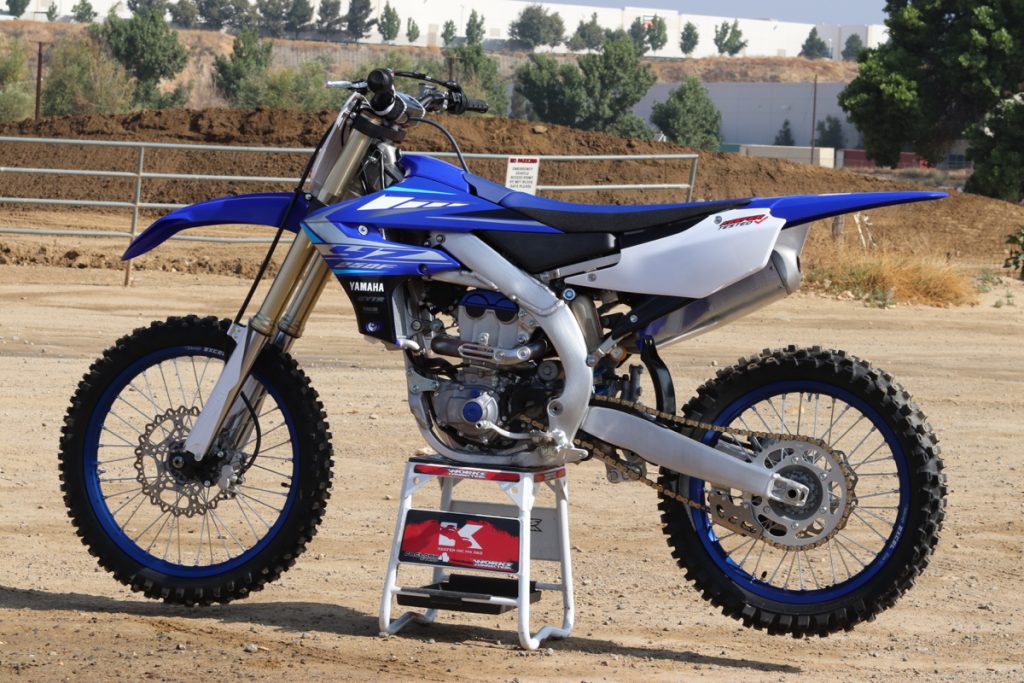
Two out of three test riders preferred the stock 13/50 gearing, but our slower heavier guy with less cornering technique liked going more the MXA (one tooth up) (13/51) route. Say what you want about going only “one tooth” up on a sprocket, but I can tell you that it does help on some machines with riders that have problems with using third gear in corners. The Yamaha has enough torque for intermediate type riders to use third gear in corners, but novices will appreciate a 13/51 ratio more to help them recover from mistakes. Going to this gearing will shorten the length of second and third gears, but it will allow you to short shift better and use the meat of the Yamaha’s power just like it was developed/intended.
Seat:
Do yourself a favor and get a 2020 YZ450F seat or a GUTS Racing firm seat foam. Yamaha changed the seat shape/stiffness in 2019, but still the middle of the seat can breakdown quickly and get soft. The fuel tank and subframes rails are not friendly when leaning on the edge of your seat or when you decide to seat bounce an obstacle out of a corner.
Rider Triangle:
Yamaha’s rider triangle can be cramped for some taller riders, but simply going to the forward bar mount hole (on the triple clamp) with mount faced back will get you 16mm’s of more room. The 2020 YZ450F comes like this stock, but you can do that slight tweak yourself and get more weight over the front end. I am 6’0 and prefer the rear hole with the mount forward, but I have heard more than one taller rider complain about being cramped on the Yamaha. I have yet to try moving the pegs down/back, but will look into this as an option for you taller riders.
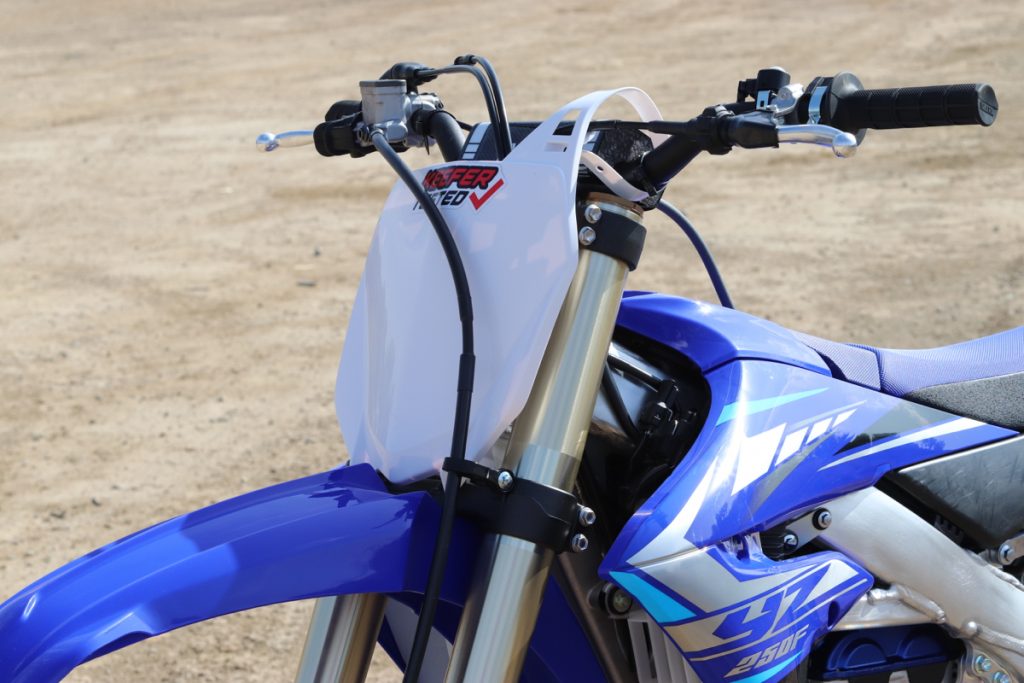
Throttle Play:
Check your YZ250F’s throttle play when you get it home. Most of the units I have seen have had a ton of free play in the throttle. The bad news is you are not able to adjust it all the way out with the top throttle cable adjusters. You will have to adjust the cables play on the throttle body in order to get most of it out. After adjusting the throttle play on the throttle body, proceed to adjust the top throttle cable adjusters to get the desired free play. Throttle play is a preference, but to me there is way too much throttle play, off the showroom floor, on the YZ250F. I have went to a couple dealerships and blipped throttles just to check and most had A LOT of play. Check your throttle free play!
Wear Items:
I am not a huge fan of the stock grips on the YZ250F as they feel fat, the chain guide and slider are actually pretty damn good on the YZ250F compared to other Japanese machines, sprockets and chains are your average 10 hour change out items, I go through clutch plates every 10-12 hours and I am fairly abusive on clutches, the 2020 air filter seals better thanks in part to a rubber grommet in the middle of the filter, but leave the backfire screen in for added dirt/particle safety, and the Bridgestone X20’s provide a good amount of traction and lean angle grip, but when they wear down slightly they are very un-predictable under hard lean angle.
If you have any questions about the 2020 Yamaha YZ250F please feel free to ask away at kris@keeferinctesting.com. Hopefully we can give you an intelligent and enlightening answer, but if we don’t know the answer to your question, we simply will reply with an “I don’t know”. We don’t know everything.

